You'd Better Ride That Wave! – Issue #319
The timing for your career peak may be limited
📚 I’m creating a series of courses, live coaching, and a peer community to help guide people on a journey from Employee to Solopreneur. The launch date will be in 2022. If you’ve ever thought about starting your own business at some point in your career, sign up to be notified. See you there!

“Success is like a lightning bolt. It’ll strike you when you least expect it, and you just have to keep the momentum going. You have to strike when the iron is hot. So for me, I just kept striking and striking to polish out the sword that I was making.”
— Michelle Phan
I’m vacationing in Maui this week (and sneaking a little work in). Therefore, it seems appropriate to use a surfing metaphor to explain a phenomenon I’ve observed in people’s professions and careers.
But, first, are you ready for something a little upsetting? Business Insider published an illustration of the ages at which you peak at several things in your life. For example:
Your brain processing power peaks at 18. Great…
Muscle strength peaks at 25. Oh, joy…
Women’s salaries peak at 39.
Men’s salaries peak at 48.
Good news! Your vocabulary doesn’t peak until 69.
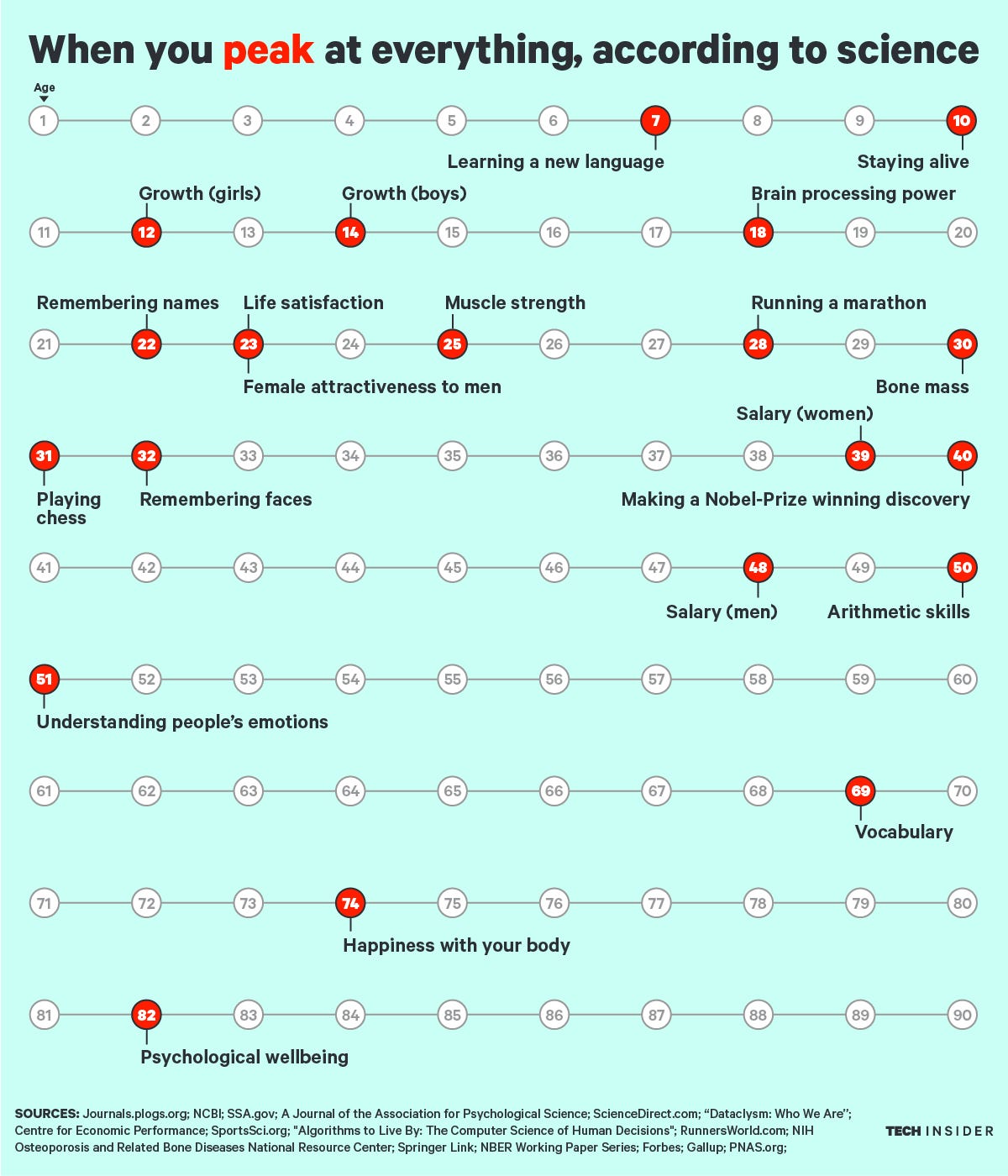
Likewise, you probably know that careers have peaks too. Some professions have very short time windows of top performance (e.g., athletes). Others can last longer, but they do eventually come to an end (e.g., surgeons).
For example:
Olympic sprinters peak in their early 20s.
The average NFL career for a quarterback is three years.
Commercial airline pilots must retire at 65.
Surgeons over 60 fall under greater scrutiny.
Some countries have mandatory retirement ages starting in your 60s.
You’re probably not surprised that blue-collar jobs and other physically demanding professions may have career peaks at younger ages. You might think that it’s different for white-collar professionals and that they can keep growing in their careers until the end, but that’s not true.
Every profession has a season. Every career has peaks and a lifespan.
Ageism is undoubtedly an issue. I experienced that in Silicon Valley.
But, I’m talking about something that seems to happen to most people, regardless of their age and independent of professions.
I’ll call it “The Wave” because it reminds me of the experience of surfing.
I lived pretty close to Santa Cruz, CA, for about 13 years. We spent a lot of time on the beaches, and my children and our friends surfed often. My good friend (who worked with me at our startup) was an avid surfer too.
I don’t surf, but I spent a lot of time observing them. If you pay attention to surfers, they spend a lot of time sitting on their boards, floating, watching, and waiting for a decent wave.
Some waves are too small even to bother. Most are average and provide a solid ride, but it ends soon, and the surfer is quickly paddling back to try again.
However, if they’re lucky, along comes “The Wave.” The one they’ve been dreaming about.
To get the most out of the experience, they have to be bold, aggressive, decisive, and committed. If they’re fearful — if they hesitate — the moment is lost.
“Being an aggressive surfer, in the positive sense of aggression, means paddling towards peaks, hunting for waves, and staying engaged and active in the ocean.” (source)
When a wave is fantastic, the ride is better and longer. Surfers hope it will never end, but we all know that it eventually will.
All good things come to an end.
Your career has waves too. It’s those moments in time when you experience accelerated professional momentum.
The stars feel aligned.
You’re crushing it at work.
Your talent is finally recognized.
You’re receiving promotion after promotion.
You land great new jobs with ease.
Your confidence soars.
Everyone seems to want more of you and what you can do.
You feel like you’re on top of the world.
You may be lucky and catch a few decent waves in your long-term career. A few people may enjoy an early wave, then flounder and struggle, but make a comeback (or change careers/professions) and have the good fortune to catch a second wave (e.g., Robert Downey Jr.).
But, most people will get one incredible ride that will determine their future and influence the rest of their life. Sadly, some people don’t even recognize when it’s happening. They fail to catch that big wave, so, instead, they ride one safe wave slowly until the end.
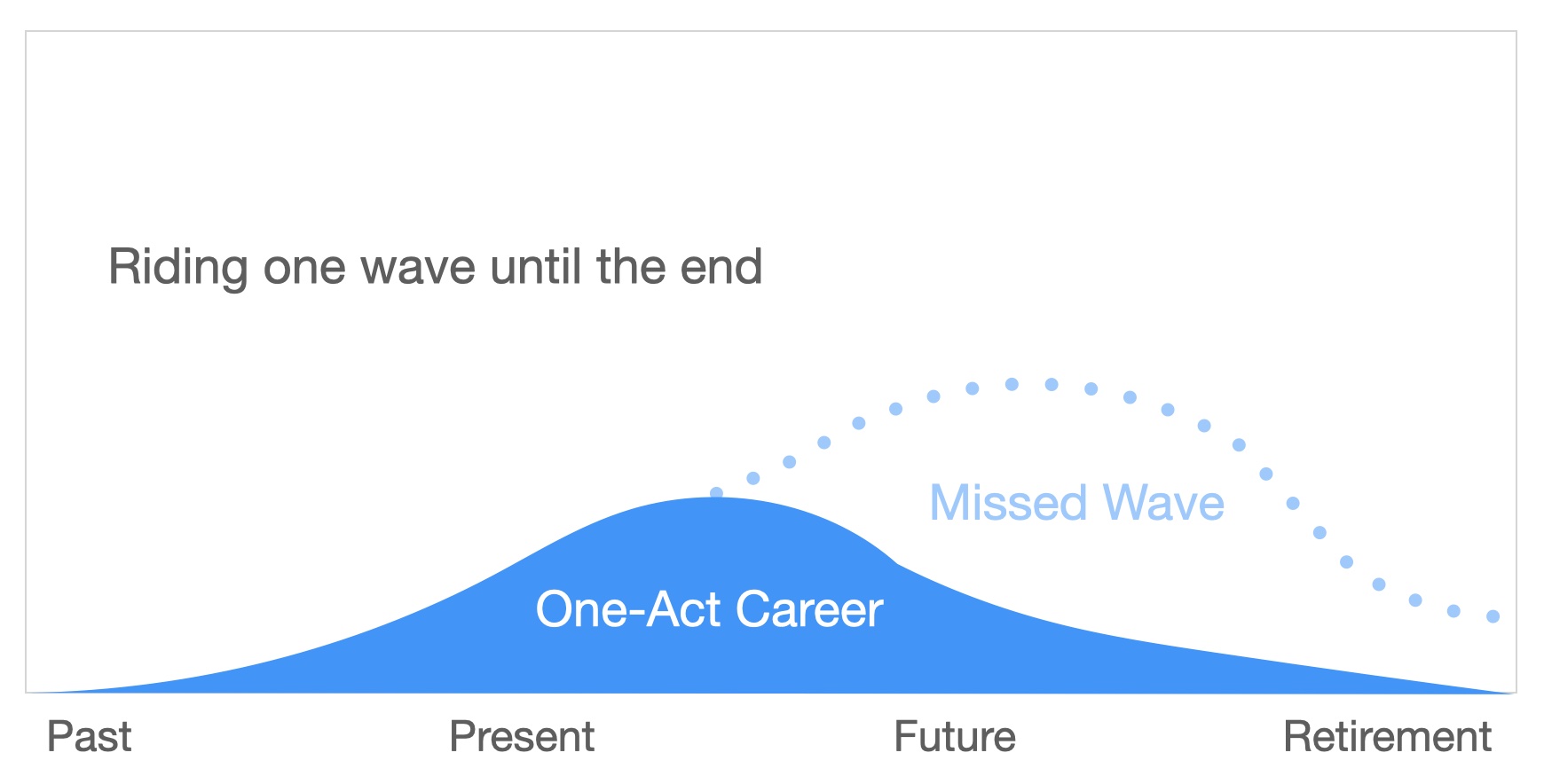
Others perk up when they realize that they are on a wave. But, they don’t capitalize on it and ride it as hard as they should. Fear, impostor syndrome, and misplaced loyalty make them put on the brakes.
This is tragic because once momentum is lost, the wave dies down, and careers stagnate. You often never get a second chance.
So, I’m here to tell you, do not make that mistake. If you’re lucky enough to catch a great wave, you’d better ride it as hard as you can for as long as you can.
But, what do I mean by “riding your wave”? How do you keep the momentum going?
Here are 10 steps that can help you make the most of your wave when it happens. I threw in a bonus step at the end too.
1. Lean into the momentum
When you feel the positive momentum of your wave — your moment in time — enjoy being a hot commodity. Lean into it and accelerate hard.
Success can become a virtuous cycle. I’m sure you’ve observed this. You may have even heard people refer to someone as “the golden girl” or “the golden boy.”
They can do no wrong. Flaws are overlooked. Everything they do is “amazing.” Everything they touch turns to gold.
When your time comes, and you know you’re riding a good wave, take advantage of it. Push hard on your goals and take bigger chances to achieve even greater things — while it lasts and while you can.
2. Don’t be afraid
“Fear causes hesitation, and hesitation will cause your worst fears to come true.“
— Patrick Swayze
I get it. Velocity can be frightening. Fear of the unknown is real.
When you’re moving up and up on a fast wave, things happen more quickly.
Your role changes.
Responsibilities increase.
Expectations increase.
You receive more attention.
People want more of your time.
Fear of failure grows.
It can be overwhelming. But, you have to overcome the fear and create strategies to manage your stress and anxiety. Get help if you need it.
You have to conquer your fear to make the most of your wave because it will end all too soon, and you’ll wish that you’d been brave enough to take advantage of it. Regret sucks.
3. Don’t put on the brakes
Some people aren’t necessarily afraid, but they do let up. All too often, I watch people succeed and immediately take their foot off the gas.
They land a new job and stop networking and planning their next move.
They publish a book but don’t promote it, do a speaking tour, or host workshops.
They get promoted and say, “Whew! I made it. Now, I can take a break.”
They let up, relax a little, and coast. I understand the desire to rest and recover a little. They’ve earned it, and you do need a breather after pushing hard to make something happen.
But, we live in a world of friction. That momentum eventually slows if you don’t keep driving forward while the wind is at your back.
Believe me, soon enough; it will stop, and, eventually, you’ll be facing into it. You’d better have enough momentum and drive to push through and keep going.
4. Kill your impostor syndrome
Almost all of us suffer from impostor syndrome at some point in our lives. I’ve had to deal with it too, so I wrote about how to overcome it.
When things are going well, and we’re making good progress, we start to question ourselves. The higher we climb, the more doubt and uncertainty creep in:
Maybe I just got lucky.
I’m not as talented as they think I am.
I’m not as bright as the people around me.
Everyone is going to find out that I’m in over my head.
This is too much. I’m going to fail soon!
I’ve watched people lose momentum due to fear and impostor syndrome. They rode successively bigger waves with each promotion and job. They were on track for even better things, but they began to doubt themselves and missed that next big wave.
Instead, they fell back and took smaller and more minor roles. Each wave faded more and more until their ride was over. Don’t let impostor syndrome rob you of a chance to maximize your potential.
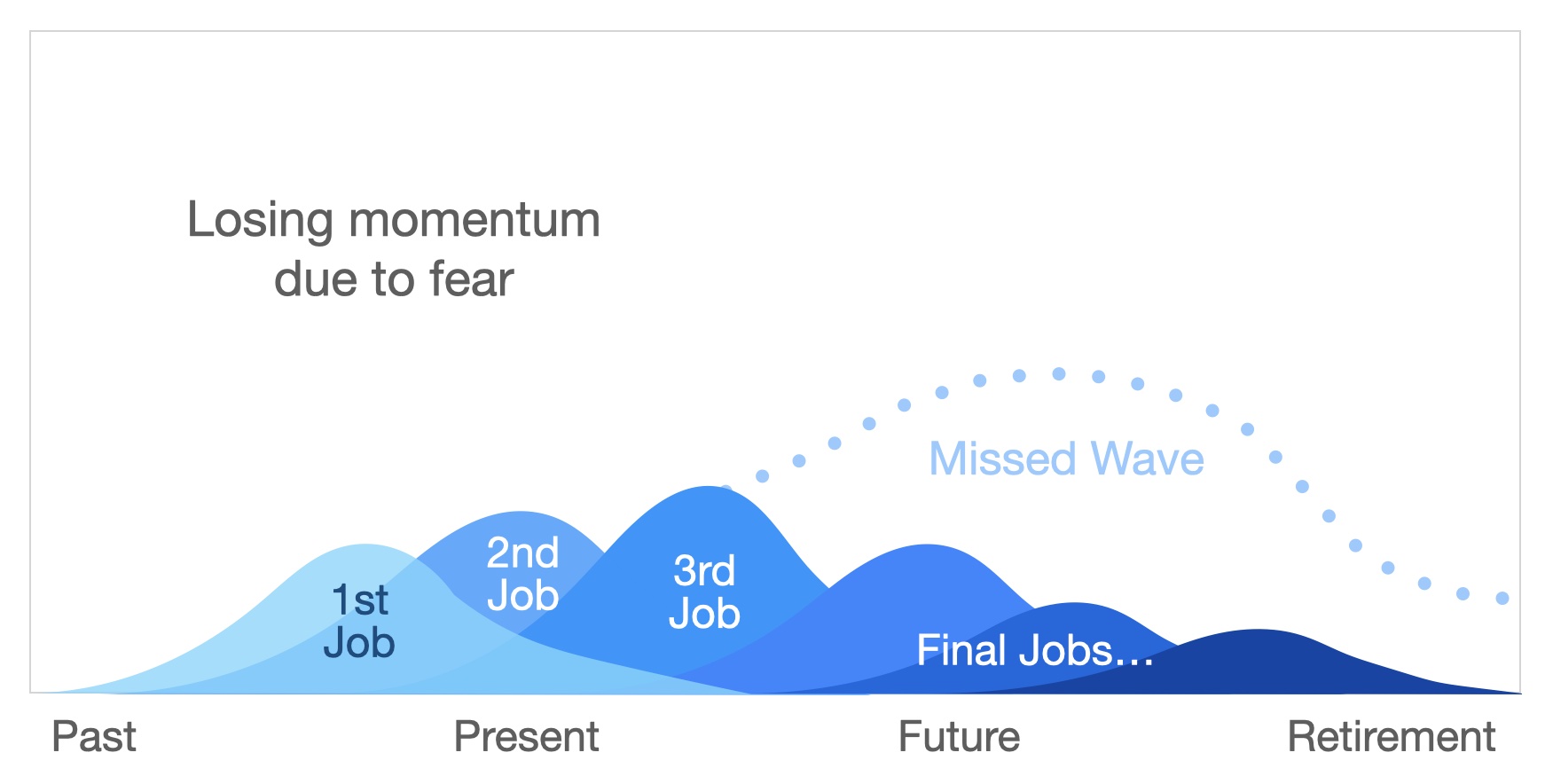
5. Eliminate friction
What’s holding you back? What’s slowing you down? We all have something that is creating professional friction and risking our career progress.
Get rid of those bad habits. Acquire the skills you need. Do whatever you can to reduce friction to keep the momentum of your wave going as long as you can.
For example, I often share how my fear of public speaking created a ton of friction in my career progress. So, I killed that fear. My career took off after that.
I was promoted five times over five years from a Lead Designer to Manager to Senior Manager to Director to Sr. Director to VP. That was my wave. I had to ride it hard while it lasted.
6. Seize opportunities
“Fortune does favor the bold and you’ll never know what you’re capable of if you don’t try.”
― Sheryl Sandberg, Lean In: Women, Work, and the Will to Lead (My affiliate link. As an Amazon Associate I earn from qualifying purchases.)
When you’re riding up to the peak of your career wave, you’ll notice that more opportunities start flowing your way. That’s what I mean by becoming an “opportunity magnet.”
One of my friends was struggling in their career for several years. No matter how hard they worked, they just couldn’t get a promotion.
So, they took control and looked for opportunities outside of the company. It took a few months and several interviews, but they finally landed an executive role with a startup. That was the tipping point.
Now, more and more opportunities surfaced. Recruiters were pinging them almost every day. An even larger opportunity presented itself.
It was a little scary, and it felt risky, but they decided to seize the chance to take on more responsibility than ever before. They landed the new job and the most significant role of their life.
7. Take bigger risks
As my friend did, you have to take bigger risks while you can, before it’s too late. This is similar to Retirement Planning 101. The earlier you can put more money into your retirement fund — and invest in higher risk/higher reward opportunities — the bigger the return will be in the end.
And, much like retirement, you don’t want to take your biggest risks in the end when you could lose everything. It’s easier to bounce back from mistakes when you’re younger and riding high on your wave. It’s pretty hard to recover when the wave is over, and you don’t have much wiggle room.
8. Be careful with your loyalty
When an employer treats you well, you should treat them well in return. Work hard and give your best to your job.
But, for most people, staying in a job for too long has diminishing returns. On average, being employed at the same company for over two years will make you earn less over your lifetime — by about 50% or more.
However, you should obviously stick around when things are going well. For example:
Your career is clearly growing within the company.
You’re regularly receiving promotions.
You’re receiving big raises (i.e., way above a cost of living increase).
You’re still acquiring valuable new skills, knowledge, and experience.
But, if your progress slows down, don’t wait too long. At one of my employers, we were hiring new employees at a higher base salary than existing employees at the same level. How messed up is that?
Don’t let that happen to you. Take advantage of your career momentum to maximize your growth and earning potential. If your employer isn’t supporting that, a new one will.
9. Build your professional brand
The best time to build your professional brand is when you’re winning. Take advantage of your momentum and push hard on creating a visible presence in your industry and online.
Grow your audience while you can. Build a strong professional network when you’re riding high on your wave.
For example, I wish that I had pushed harder to build my following on Twitter when I joined in 2007 and was doing a lot of public speaking around the world. I also wish that I had started this newsletter back then!
If you’re clever, you already know what your next industry might be too (i.e., your 2nd act career). So, now is the time to dial up your visibility, showcase your work and how you think, and start building your new professional brand.
For example, I worked with some people who had a day job in one profession but were writing and building up their next profession a little every week. For example, they were developing a reputation as an author while still riding the wave of their first career.
Then, when the time was right, they caught an even bigger wave to transition to their second career. One person I know is still riding to the crest of this second wave. They haven’t even peaked yet, but it is much, much larger than where their first wave was taking them.
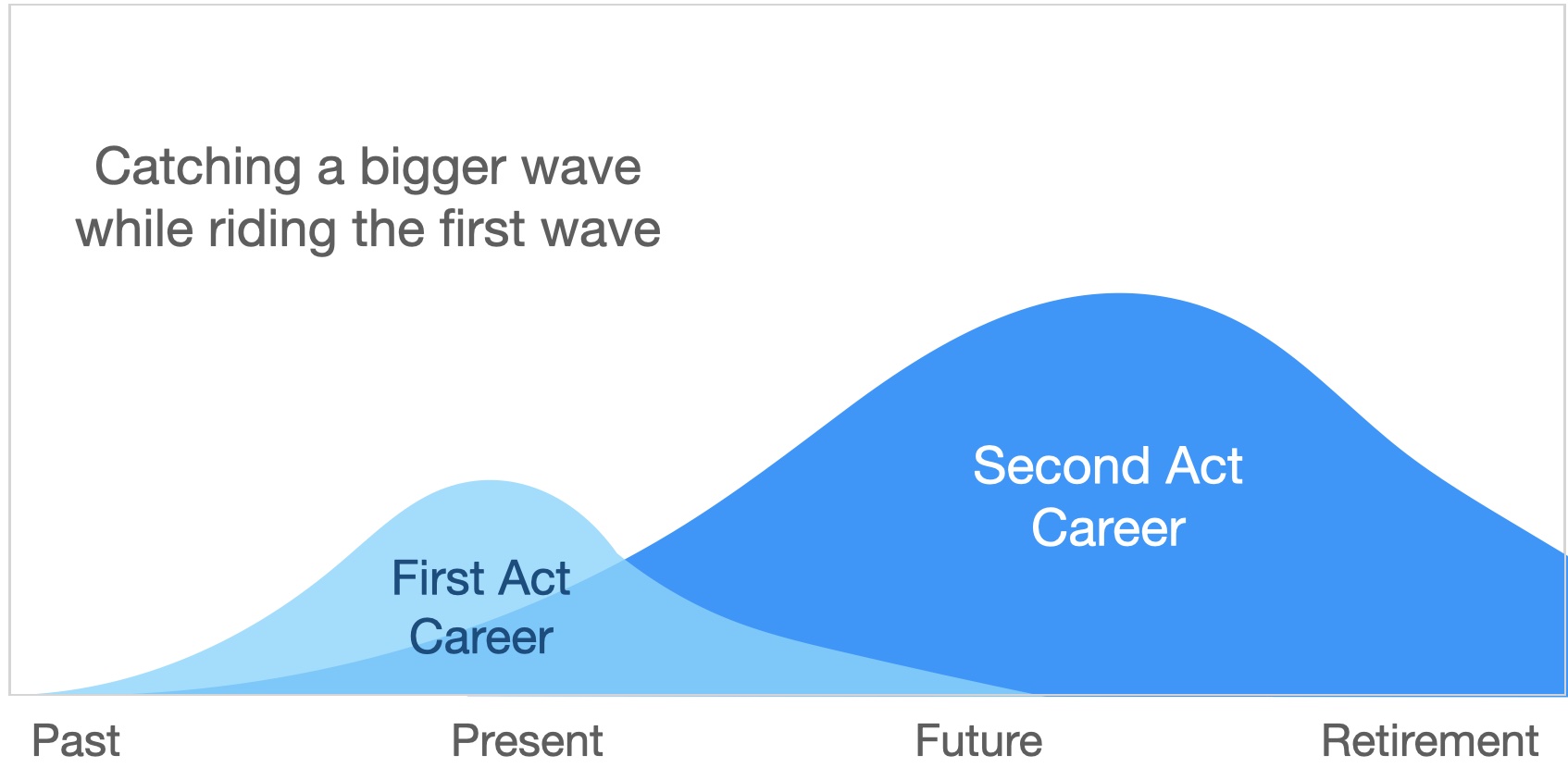
10. Capitalize on your success
“Success begets success. I’ve been offered a lot of movies now that ’30 Rock’ has been successful.”
— Alec Baldwin
When you’re in the middle of riding your big wave, take advantage of your good fortune. Find ways to extend your success in one arena into opportunities in others.
Grow your network and connect with more powerful people.
Become an advisor to startups and small businesses.
Join the board of a company or two.
Spin up a consulting business on the side (while people know your name).
Found your own startup and raise funding.
Start your own business and leverage your hot professional brand to grow more quickly (while you can).
However, smart people know that what goes up must come down. Good weather doesn’t last forever, and winter will eventually come. Need another metaphor? 🤣
When your success pays off, resist the urge to grow your lifestyle to match. I’ve watched too many people live just within their means (or beyond) because they thought their career wave would keep rising up and up and up. When it slowed or even reversed, they found themselves in financial trouble.
Finally, be careful and don’t overextend yourself. I know that I’ve been coaching you to push hard and ride your wave while it lasts. But, do so within reason. Don’t burn out!
Bonus step: Create a transition plan
All waves end eventually. All of them.
What will you do next? What can you create that will sustain you for the rest of your career?
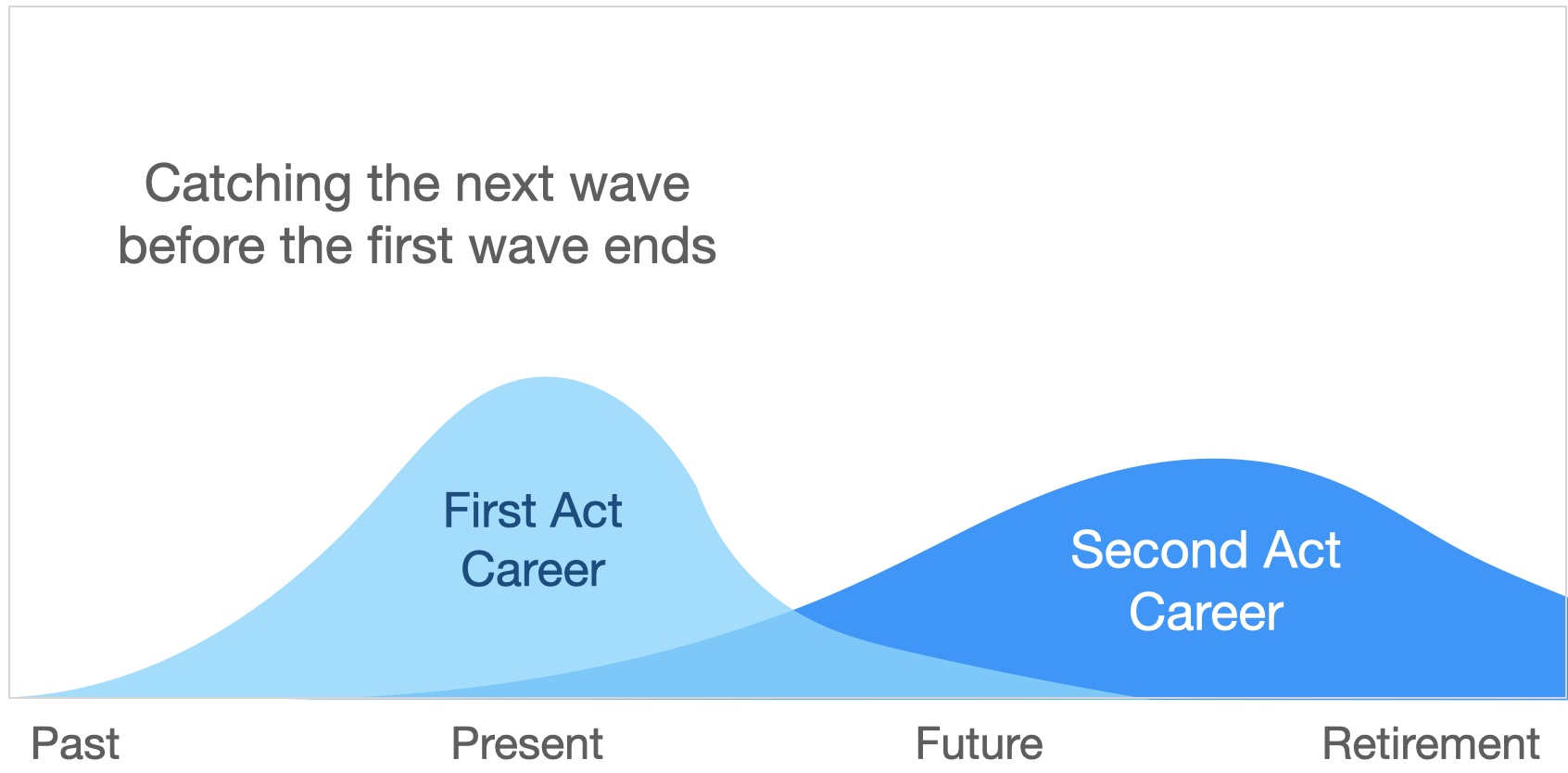
Use your remaining momentum to create a transition plan that will let you coast to the “finish line.” Find something meaningful to do with your remaining days. Full retirement sucks anyway.
People say that they look forward to leaving work and doing nothing but fishing or golfing every day for the rest of their life. But that’s a bad idea.
People who retire earlier die earlier. We all need purpose in our lives. Frittering away your time with nothing but recreation isn’t a purpose.
“You are never too old to set another goal or to dream a new dream.”
— C. S. Lewis
Reach back and help others. This recommendation is less about momentum — and climbing higher — and more about giving back and feeling fulfillment.
Successful actors become directors before it’s too late (e.g., Ron Howard, Penny Marshall, Jodie Foster).
Hot music artists start their own record label (e.g., Jay Z, The Beatles, Dave Grohl.
World-class athletes know when to hang it up and transition into coaching (e.g., Bill Russell, Martina Navratilova, Mike Ditka).
People like me leave the corporate world and advise the next generation of leaders.
When you choose the right wave and ride it well, it sets you up for the rest of your career journey. When you reach the end of that wave, you can intentionally create your own wave that will take you the rest of the way.
That’s what I’m doing, and I’m happy to help you plan how to do it too.
⬆️ Scroll to the top if you want to listen to my more detailed reading of this article🎧
Ready to join my private community?
Subscribe now, and I’ll send you an invitation to join my private community of ambitious professionals who help each other become more successful and fulfilled in their working lives. Once you’re in, you’ll be able to participate in our exclusive office hours every week and chat with the other members and me every day!
Are you ready to turn a $15/month investment into thousands of dollars of increased income every year? That’s precisely what has happened for many people in my community.
However, I do know that not everyone is ready to become a paid subscriber yet. But, there is a great way you can support my work without spending any money:
📣 Recommending my newsletter on social media 📣
It only takes a few seconds, and it helps grow my business so I can continue making time to write it.
I’ll even provide some copy and paste text to make it easy to share on Twitter, Reddit, LinkedIn, Facebook, etc. Thanks in advance!
I’ve really been enjoying the Invincible Career newsletter by Larry Cornett (@cornett). If you want to get ahead at work and be happier in your job, but you aren’t subscribed yet, you’re missing out.
https://newsletter.invinciblecareer.com
This week’s office hours topic
⭐ Office Hours – Explore Your Own Podcast
Larry Cornett is a leadership coach and business advisor who hosts a private mastermind community for ambitious professionals with weekly challenges, office hours, and 24×7 support. If you’re interested in starting your own business someday (or accelerating an existing one), check out his “Employee to Solopreneur” course (launching in 2022).
Larry lives in Northern California near Lake Tahoe with his wife and children, and a gigantic Great Dane. He does his best to share advice to help others take complete control of their work and life. He’s also on Twitter @cornett.


On Spotify
https://open.spotify.com/episode/69Jeb3tZsucpRcbpj1hDsf?si=2gVJxRyrQw-tgkjaHiILrg
Apple Podcasts
https://podcasts.apple.com/us/podcast/youd-better-ride-that-wave-issue-319/id1551888961?i=1000538472298
Published on LinkedIn
https://www.linkedin.com/pulse/youd-better-ride-wave-issue-319-larry-cornett/